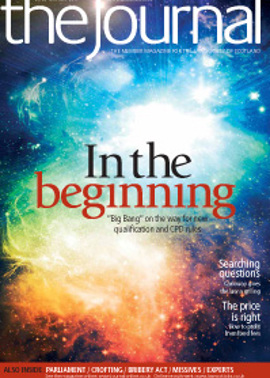Interested parties

Title and interest to sue
In AXA General Insurance Ltd v Lord Advocate [2011] CSIH 31 (12 April 2011) the First Division made certain observations regarding title and interest as they applied to the challenge of the Damages (Asbestos-related Conditions) (Scotland) Act 2009. Their Lordships observed that title and interest to sue was often determined as an issue separate from the merits of any action. The petitioners as insurers were members of a class of persons who risked being directly affected by the legislation. They, effectively, were the persons who defended the actions which would follow the legislation. These litigations would be fought on their instructions. Some of the companies who had employed the claimants no longer existed in any event. If the insurance companies could not challenge the legislation in these proceedings, it was difficult to see how they could otherwise challenge it. Any actions for damages would be raised against the actual employers of the claimants. At common law, the Scottish Parliament had a duty to act in conformity with the law.
In relation to the title and interest of actual claimants to resist the challenge, the Inner House decided that they had no such title and interest. Whilst they were beneficiaries of the legislation, the identification of such potential beneficiaries was virtually impossible. Further, it was for the proposer of the legislation to support its validity.
Separate defenders and unconnected grounds of action
In Ruddy v Chief Constable of Strathclyde Police [2011] CSIH 16 (2 March 2011) the Inner House considered an appeal from a decision in an action of damages raised in Glasgow Sheriff Court. The action was raised against the chief constable on the basis of the pursuer having been the victim of an assault by police officers. These allegations were still in issue at the time of the appeal. The pursuer also sought to claim damages in the same crave in respect of a breach of article 3 of the ECHR (diminishing his human dignity as being the subject of degrading treatment).
The pursuer further sought damages as a result of the investigation of his complaint of ill treatment being reported to the procurator fiscal, whose investigation was criticised by the pursuer. Following the investigation no prosecution was initiated and no disciplinary action was taken against any officer. These acts and omissions were alleged to breach the pursuer’s rights in terms of article 3 of the Convention. A second crave for damages sought jointly and severally or severally against both defenders was founded on these allegations.
The Inner House raised the issue of competency ex proprio motu and queried the competency of this approach in which several claims were pursued in one action. The alleged breaches of the pursuer’s Convention rights were dependent on his first proving that he had been assaulted, a matter which had not been established. Further, many of the allegations regarding the inadequacies of procedure raised issues of administrative law which arguably should be the subject of proceedings for judicial review. In considering the issue of competency the Inner House concluded that the craves were directed against different defenders based on different causes of action. The pursuer sought to address three distinct issues, distinguishable in fact and law, against two separate defenders. In such circumstances one action could not be raised, albeit separate actions might be conjoined. In the present litigation the pursuer sought to pursue two parties in respect of unconnected wrongs. To do so invited complexity and lack of good order.
Interim interdict
In Smyth v Rafferty [2011] CSIH 27 (1 April 2011) the Inner House noted that at the stage of determining the grant or refusal of interim interdict at the commencement of an action it was necessary to consider whether there existed a prima facie case. However, consideration had to be given for the stage of proceedings. Averments could be substantially strengthened as a result of the adjustment process. If the order was recalled the object of the action would be defeated.
Minutes to sist
In B v B 2011 GWD 13-291 a child, who was 12 years of age, applied to be sisted as a party to an action between his parents in which s 11 orders were sought. The parents agreed that it was in the child’s best interests that he have contact with his father. Five days of proof had taken place. A curator ad litem had previously been appointed in respect of the child, albeit the child indicated that he had lost confidence in the curator. The sheriff refused the application, determining that the boy could still express his views through the curator. The basis for the child’s alleged loss of confidence could be examined in evidence.
This decision was appealed but Sheriff Principal Bowen refused the appeal. To allow a new party to enter the process at this stage of procedure when two principal witnesses had given evidence was a significant factor in the refusal. To do otherwise might well require the witnesses to be recalled. The child had a means not only to express his views but to have his position put forward through the curator. To become a party to the action would expose the child to the pressures of the litigation and this might well not be in his interests. In considering such an application the court should consider whether the child could cope with the consequences of becoming a party to such an action and had the ability to give sufficiently objective instructions. The court had real doubt as to whether the child could give anything other than restricted instructions.
Appeals
As a general rule an interlocutor pronounced of consent cannot be appealed. There can be exceptions. In Thomson Roddick and Laurie Ltd v Katalyst Projects Ltd, Dumfries Sheriff Court, 18 March 2011 Sheriff Principal Stoddart allowed an appeal which had been taken following an interlocutor pronounced of consent. The action was one of implement which failing damages. The sheriff had found the pursuers entitled to implement, but instead of granting decree had continued the case to be addressed on issues such as the period allowed for implement, the consequences of non-implement, and if damages ultimately were necessary, whether a further proof was required. Following this subsequent hearing, the interlocutor from which was pronounced of consent, the defenders appealed.
The appeal was held to be competent. The sheriff principal indicated that the interlocutor appealed, albeit pronounced of consent, followed inevitably from the sheriff’s decision on the merits. It really was more in the form of tidying up procedural matters which flowed from the prior interlocutor on the merits. It was the former interlocutor that the defenders sought to challenge in any appeal. The defenders had not acted in any way to suggest that they had acquiesced in the terms of that interlocutor. As an aside, the note by the sheriff which followed the lodging of the note of appeal went much further than the reasons for pronouncing the interlocutor, including matters such as the competency of the appeal and potential courses open to the defenders. Such matters were for the sheriff principal to determine and should not form part of such a note.
Update
Since the last article Grant v Barnett (November 2010) has been reported at 2011 SLT (Sh Ct) 13.
In this issue
- Experience not to be missed
- Call in the experts
- Planning to deliver
- Stars of the future
- Registered Paralegal Scheme hits the mark
- CPD: a personal quest
- Wha's like us?
- Holyrood: a verdict
- Public ethos
- Power in name only?
- From the Brussels office
- Minority voices
- Law reform update
- Quinn Direct - when to intimate?
- Name your price
- Ask Ash
- Communication breakdown - a major risk issue
- Interested parties
- Support from afar
- Plus ça change?
- Where the state has to stop
- A NEST egg?
- Scottish Solicitors' Discipline Tribunal
- Website review
- Book reviews
- Above board
- Ruaig an Fhèidh
- The price of breach






